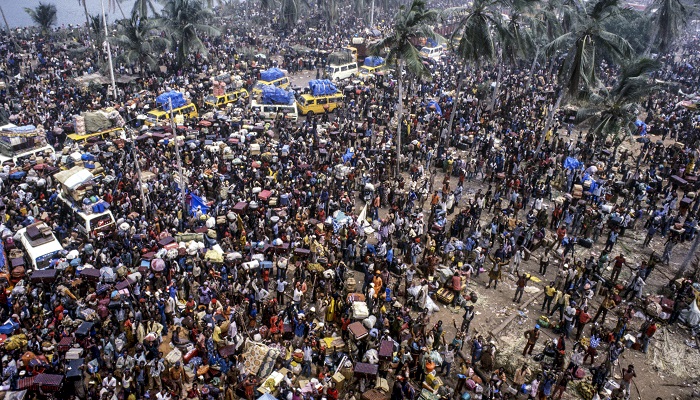‘Ghana must go’ has become a common phrase in both Nigeria, where it originated from and Ghana. The story of the biggest expulsion of citizens in African history is commonly believed to have been carried out in 1983. However, it seems the root cause dates back over a decade – way back to the 1960s.
Let’s Start from the Beginning, Shall We?
Maybe to understand the reason for what happened in 1983, we’ll have to first know what happened when Nigerians were sent packing from Ghana in 1969.
The Ghanaian Prime Minister, Kofi Busia, in 1969 invoked the Aliens Compliance Order and Deport. This saw the expulsion of over 2 million undocumented African migrants living in Ghana at the time. The majority of these people were Nigerians who had almost taken over trade and businesses from the locals in Ghana.
Then, Nigerians had the busiest, thriving businesses and were ever ready to sell at any time and to whomever. This group of migrants was everywhere; schools, villages, and markets, and owned the most successful businesses.
The growth and spread of the Nigerians greatly annoyed Ghanaians who believed they were losing a lot to the now-giant of Africa.
To top it up, Ghana was going through financial instability at the time, yet their Nigerian brothers were having ease and access to a lot. In fact, they got these things at cheaper prices.
This expulsion of Africans, most of whom were Nigerians, from Ghana was a rude shock. At the time, most people had intermarried and had lived long enough in the country to believe they had ties binding them there.
Nonetheless, the decision was final and the move had to be obeyed. Just before the 1970s, Ghana, suffering from economic instability, was able to expel almost 3 million aliens from their country.
SEE ALSO: 10 Richest African Kings Today Vs Mansa Musa
The Tale of What Happened to Ghanaians in Nigeria in the 1980s
Maybe it is revenge, maybe it isn’t, but, when Nigeria had a reason to send undocumented immigrants back to their homelands in 1983, they didn’t flinch. The bulk of these migrants in Nigeria then were Ghanaians. Coincidence? Stay with us.
Back in the late 1950s, Nigeria experienced a huge economic boom with the discovery of oil in the country. Even before she gained her independence in 1960, Nigeria had started enjoying the benefit of oil money.
It was obvious that the country would prosper with this newfound wealth and so it did. There were devastating challenges like the concurrent military takeovers and regimes. This threatened the economic growth of the country but did not succeed in putting it off.
With the rise in oil prices around the world, the economy of Nigeria boomed and blossomed in the 1970s. By this time, Nigeria earned herself the nickname ‘Giant of Africa’ and was Africa’s wealthiest nation.
The production of oil, daily, was as high as 2.3 million barrels by 1974. The people living in Nigeria enjoyed themselves greatly at this point. Their standard of living improved, people had jobs and the towns became enticing due to urbanization.
Not only did Nigerians living in rural areas and villages move to the major towns and cities, but people from other countries also did. These people became teachers, cobblers, ice cream sellers, nannies, security guards, and so on.
Immigrants saw how rich Nigeria had become and felt the need to come to enjoy some of the goodness that came with oil discovery.
While the African Giants flourished, their neighbors, the Ghanaians, were in great trouble. There was a mix of famine and insurgency which affected the country and forced a lot of people to flee. It was so bad that most people hadn’t the money to feed and even when they got money, there was no food to buy.
As oil was found in Nigeria and she was flourishing, Cocoa which was Ghana’s major export and source of income dwindled greatly.
As a result, Nigeria saw an influx of many Africans from all across the continent. However, Nigeria’s wealth also began to diminish as oil crashed, so, her wealth didn’t last for so long.
There was a dip in global oil prices in 1982 with Canada and the United States slipping into recession. These countries were the major consumers of the oil produced in Nigeria and they couldn’t afford to buy as much as they used to.
The demand for oil from Nigeria was low and the price had crashed from $37 per barrel to $29. Then, the United States also discovered she could produce oil as well and started her production.
Now, Nigeria suffers from less demand and increased supply. With the country’s over-reliance on oil, this new development hit badly.
Food became very expensive and the standard of living dropped for the average Nigerian.
The Giant of Africa then began to point accusing fingers at the aliens who were in their country.
With elections around the corner, most politicians began to promise to eradicate foreigners from Nigeria.
By 1983, Shehu Shagari became the president of Nigeria and he followed up with his promise of expelling foreigners from the country. He gave January 17 as the date for all immigrants to leave the country. However, it was later extended to January 31, 1983.
With the decree, about 2 million foreign, undocumented migrants from across Africa were to return to their homelands. Half of these illegal migrants were Ghanaians. Payback time?
The reason for this was simple and almost similar to what the Ghanaians did some 14 years back.
Nigerians were at a low place and they did not want foreigners to enjoy what the indigenous people hadn’t access to.
READ ALSO: Every African Country, Capital, How It Got Its Name, Most Spoken Language
Consequences of the Expulsion

From research, it seemed like a lot of foreigners did not take the decree seriously. Most migrants remained put in Nigeria until it was announced that any foreigner caught would be arrested, tried, and deported.
In fact, the chase got quite serious that Nigerians harassed and assaulted foreigners. By the 31st of January 1983, it was obvious that there would be no going back on Shagari’s words, and every public transport was crowded.
People began to scramble to leave the country and they were in large numbers. Ghanaians suffered the most as the means of returning home was quite difficult.
The then head of state in Ghana, Flt. Lt. Jerry John Rawlings blocked all entrances from Togo into Ghana. He did so to curb insurgency and coups against his government.
All Ghanaians crossing over back home by road were to pass from Benin Republic to Togo and then into Ghana. However, they mostly made it to Benin and were stranded.
- Rawlings then came to the aid of his people and opened up the borders allowing ease of access into and out of the countries. He also sent ships to Cotonou to reduce the number of road travelers to Ghana.
Unfortunately for some Ghanaians who took the ship, they fell into the sea because the ship was crowded and people scrambled for space on it. Ghanaians lost many citizens during this movement.
Why the Chinatown Tote Bag is called Ghana Must Go
What most Nigerians and even Ghanaians now call the ‘Ghana Must Go’ bag is also known as the Chinatown tote or Turkish suitcase. It is also called the refugee bag in other places.
This bag became popular in 1983 because it was the easiest and most suitable bag for expelled immigrants to pack their belongings into.
Many Ghanaians bought these bags in their different sizes to fit in all their clothes and whatnot. As a result, the bag became famously referred to as Ghana must-go bag.
In Ghana, it is also called Efiewura Soame’ which means ‘Landlord Carry Me’’.
This isn’t the only mockery the Ghanaians have had to suffer due to Shehu Shagari’s declaration, though. In Cote d’Ivoire, there is a popular idiom that is translated to ‘To fall like Ghana’. ‘Tombe comme le Ghana’ is used to describe an unfortunate incident that happened to a person like the fall of Ghana following their deportation from Nigeria.




















